Metazoa: Animal Minds and the Birth of Consciousness
£9.50£10.40 (-9%)
The follow-up to the BBC Radio 4 Book of the Week Other Minds
A Times and Sunday Times Book of the Year
A Waterstones Best Book of 2020
The scuba-diving philosopher explores the origins of animal consciousness.
Dip below the ocean’s surface and you are soon confronted by forms of life that could not seem more foreign to our own: sea sponges, soft corals and flower-like worms, whose rooted bodies and intricate geometry are more reminiscent of plant life than anything recognisably animal. Yet these creatures are our cousins. As fellow members of the animal kingdom – the Metazoa – they can teach us about the evolutionary origins of not only our bodies, but also our minds.
In his acclaimed book, Other Minds, Peter Godfrey-Smith explored the mind of the octopus – the closest thing to an intelligent alien on Earth. In Metazoa, he expands his inquiry to animals at large, investigating the evolution of experience with the assistance of far-flung species. Godfrey-Smith shows that the appearance of the first animal body form well over half a billion years ago was a profound innovation that set life upon a new path. He charts the ways that subsequent evolutionary developments – eyes that track, for example, and bodies that move through and manipulate the environment – shaped the lives of animals. Following the evolutionary paths of a glass sponge, soft coral, banded shrimp, octopus and fish, then moving onto land and the world of insects, birds and primates like ourselves, Metazoa gathers these stories together to bridge the gap between matter and mind and address one of the most important philosophical questions: what is the origin of consciousness?
Combining vivid animal encounters with philosophy and biology, Metazoa reveals the impossibility of separating the evolution of our minds from the evolution of animals themselves.
Peter Godfrey-Smith’s book ‘OTHER MINDS’ was a Sunday Times bestseller w/c 10-05-2021.
Read more
Additional information
| Publisher | 1st edition (8 July 2021), William Collins |
|---|---|
| Language | English |
| Paperback | 288 pages |
| ISBN-10 | 000832123X |
| ISBN-13 | 978-0008321239 |
| Dimensions | 12.9 x 2.3 x 19.8 cm |

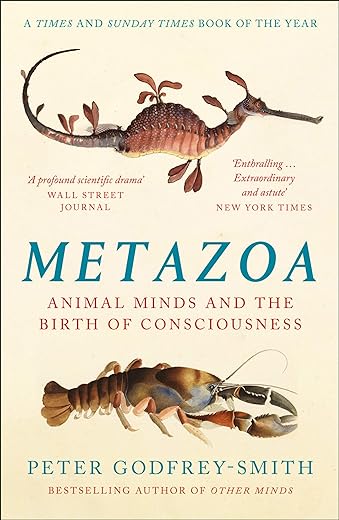
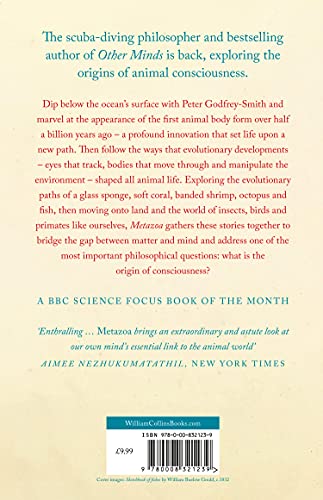
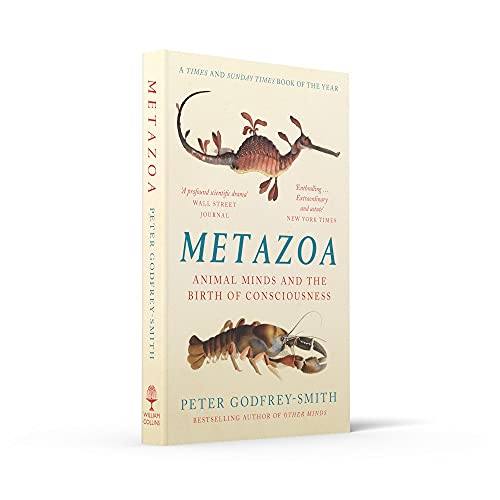


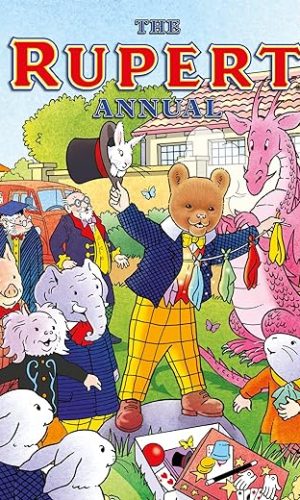
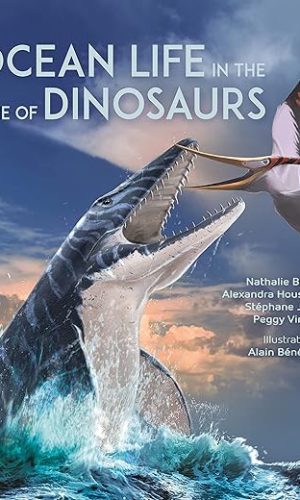




by Steve C
I was really hoping for somebody to build on Nagel’s groundbreaking “Mind and Cosmos”. Unfortunately, this is a misguided attempt to drag us backwards. It gets 2 stars for at least trying to engage with where this is going. At least it’s better than Dennett.
by docread
The scuba diving philosopher has written a sequel to his last best seller “ Other Minds” developing similar themes about the evolution of animal sentience and consciousness. While observing the diverse marine fauna in their habitat and tracing their common evolutionary origins with their complex branching, he ponders the sentient changes graduating from the most basic organisms and culminating with the human mind. He shows remarkable skills for blending beautifully written zoological descriptions with astute personal observations combined with the latest findings of cognitive sciences, and with philosophical musings about the nature of subjectivity, selfhood and consciousness. By mastering this unique formula he grabs the reader’s constant attention, while guiding him through the realms of evolutionary genetics and morphology, animal behaviour experiments and the philosophical theories of Aristotle, Descartes, Heidegger, Wittgenstein, Dennett and Nagel. His overarching thesis is that all living forms have a degree of sentience to engage with their environment. This sentience comes into being gradually and in different degrees with Evolution. It evolves with the development of increasingly sophisticated nervous systems progressing from border line states to a fuller sense of subjective selfhood and in the process imparting unity and purposeful action for the organism. There is no sudden jumping up over thresholds from basic sentience to a fuller selfhood, within this gradual seamless evolutionary process.
Evolution has shaped animals through evolving nervous systems into centres of sentience and agency providing with various degrees a sense of the self. Engagement with the world through the senses leads to coordinated action within a unified organism controlled by a nervous system. Sentience comes into being gradually starting from the most basic multicellular animals to the Cephalopods, Arthropods , Birds and Mammals. Minimal sentience implies minimal cognition which leads to some kind of subjectivity. The author calls this subjective experience even in its most basic form, the animal “ experiential profile”, that is the totality of sensory experiences from moment to moment. In animals with rudimentary nervous systems , these sensory experiences are not necessarily accompanied by the “ evaluative” experiences such as pain, stress, fatigue etc. The add on “qualia “ are progressively manifest in animals with more sophisticated nervous systems.
The Author rejects the notion that one’s conscious experience can only contain one thing at a time , that is the narrow pathway views of experience advocated by the “flat mind” psychologists. Our experiential profile is much broader, containing both foreground and background attention with their dynamic interactions. His critical evaluation of artificial minds is pertinent as he reminds us that computers are designed to create illusions of agency and subjectivity, that cannot replicate the physical and biological basis of embodied human cognition and sentience. Again he criticises the anthropomorphic model of consciousness founded on a tacit selfhood, with its various neuroanatomical locations and inter-synaptic connections/correlations. This model propounded by some cognitive scientists, reduces the great diversity of animals’ sentience and ignores the wide spectrum of idiosyncratic subjective experiences in the zoological realm. Sensing and minimal cognition exist in all the life around us. The “being there” or the “where and when” kinds of experience, even as we lack appropriate descriptive words, can be inferred by observing different organisms in their respective habitat, from the crab to the octopus, from the bird to the dog.
He concludes that we must extend care and consideration to all sentient animals and protect their interests by giving up the traditional divide between humans and animals. This is an engrossing work that educates as well as enchants, while strengthening our emotional and cognitive bonds with the rest of life.
by Fausto
I found the previous book “Other minds” is definitely much more interesting.
by Julian Williams
I came to “Metazoa: animal minds and the birth of consciousness” after reading Godfrey-Smith’s earlier book on the mind of octopuses and cephalopods which I had enjoyed very much. I have read a number of books trying to pin down what consciousness is and how it came to be. G-Smith’s approach is amongst the most successful. Other books I have read mostly approach the subject from the perspective of understanding human thought and brain structure, and then perhaps add a bit of evolution of other animals to the picture along the way, and the animals are mostly mammals.
There is a common thread developing in the books I have been reading, where the writer’s have been linking all sorts of attributes we think of as being particularly human ( for instance morality, empathy, emotion, traits of intelligence and altruism) back to very basic biology; the behaviour the single cell and intercellular activity, homeostasis, energy efficiency etc. In short there seems to be a consensus that our human traits evolved out of primal evolutionary forces on intercellular activity. This book really gets to grips with this idea from the point of view that all this stuff started in the sea, and we humans, with our intelligence and consciousness, are but one of many current outcomes.
Godfrey Smith has come to thinking about consciousness through his love of diving and wondering about the sentience of cephalopods. This brings to the book a thread of poetry and discovery, out of which his inquiring mind sifts meaning. Through a combination of deep reading into science, imagination and observation whilst diving he has developed a philosophical approach that fairly unique and perhaps less anthropo-centric than any other account of consciousness I have read. He sees an octopus mind as being sentient and conscious, but in ways that we can only imagine through the the fussy optic of metaphor, and through which we obviously see their sentience/consciousness obscurely.
He is very good at going through the old arguments and philosophical questions, such as in his account of account of qualia, and the Chalmer’s/Dennett “hard question” debate which was beautifully succinct. He comes to the obvious conclusion that looking for “intrinsic qualities of experience (the redness of red)” a first person experience) cannot be explained a proposal built of “switches and signals” that is made and seen in the third person. He also suggests the elusive experiential quality of consciousness is as dependent on electromagnetic fields and waves, as it is on synaptic activity.
He points out that sentience, consciousness and intelligence have developed many times, and is being driven and shaped by evolutionary forces that are similar, however the nature of the outcome is developed to fit into different bodies and evolutionary niches in different circumstances. So the outcomes, “the experiential profile” (experience – activity felt from the inside) is felt differently for each animal. The fact that an insect has no experience of pain does not in itself mean that the insect has no experience, all it means is that evolution has removed pain from the experiential profile that an insect experiences.
There are many good chapters which deserved reading through twice. I particularly enjoyed the last chapter “Putting it all together”. He concludes that we, and all animals, have “an experience profile” which changes as moment pass.
The book stops short of examining the human mind, but he gives us a strong hint that this is the subject of his next book. I think this third book in what is becoming a trilogy about how consciousness evolvedt will put many of his ideas into a new framework, and it will be worth reading
by Piotr Cuber
Great book.